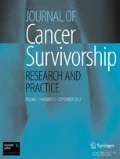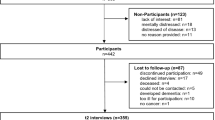Abstract
Background
Although generally well-adjusted, a subset of cancer survivors have been observed to experience ongoing psychological distress. There has been little study of mental health care utilization among cancer survivors, however.
Materials and methods
We identified a cohort of cancer survivors continuously enrolled in a managed care organization who were alive at least 5 years after a diagnosis of cancer and without evidence of recurrence. We matched them each to four controls without a history of cancer based on age, sex, and clinic location. We then obtained their health care claims and evaluated their health care utilization along with explanatory variables such as cancer type, non-cancer comorbid conditions, and types of health care providers seen.
Results
One thousand one hundred eleven survivors were matched to 4,444 controls. Cancer survivors were more likely than controls to have a mental health diagnosis (33.5 vs. 30.3%, p < 0.05), accounted for mostly by anxiety and sleep disorders. Other predictors of receiving any mental health diagnosis on multivariable analysis were age: Odds Ratio (OR) 0.99 (95% Confidence Interval (CI) 0.99–0.99) for each year; male sex: OR 0.87 (95% CI 0.77–0.99), and comorbidity: OR 0.56 (95% CI 0.49–0.64) for each point on the Charlson scale. The largest subgroup was breast cancer survivors, who were more likely to have a diagnosis of major affective disorder than were female survivors of other cancers. Survivors had more outpatient medical visits in general (mean 27.4 versus 21.9, p < 0.001) and specifically more mental health visits (2.5 versus 1.7 on average, p < 0.001) than did controls.
Conclusion
Long-term cancer survivors have increased rates of mental health care utilization. Given the size and growth of the survivor population, this represents a significant amount of ongoing distress with important health resource allocation implications for policy makers.
Similar content being viewed by others
References
Burgess, C., Cornelius, V., & Love, S. (2005). Depression and anxiety in women with early breast cancer: Five year observational cohort study. BMJ, 330, 702.
Carney, C. P., Woolson, R. F., & Jones, L. (2004). Occurrence of cancer among people with mental health claims in an insured population. Psychosomatic Medicine, 66, 735–743.
Charlson, M. E., Sax, F. L., & MacKenzie, C. R. (1986). Morbidity during hospitalization: Can we predict it? Journal of Chronic Diseases, 40, 705–712.
Charlson, M. E., Pompei, P., & Ales, K. L. (1987). A new method of classifying prognostic comorbidity in longitudinal studies: Development and validation. Journal of Chronic Diseases, 40, 373–383.
Deyo, R. A., Cherkin, D. C., & Ciol, M. A. (1992). Adapting a clinical comorbidity index for use with ICD-9-CM administrative databases. Journal of Clinical Epidemiology, 45, 613–619.
Field, T. S., Cernieux, J., & Buist, D. (2004). Retention of enrollees following a cancer diagnosis within health maintenance organizations in the Cancer Research Network. Journal of the National Cancer Institute, 96, 148–152.
Hewitt, M., Breen, N., & Devesa, S. (1999). Cancer prevalence and survivorship issues: Analyses of the 1992 National Health Interview Survey. Journal of the National Cancer Institute, 91, 1480–1486.
Hewitt, M., & Rowland, J. H. (2002). Mental health service use among adult cancer survivors: Analyses of the National Health Interview Survey. Journal Clinical Oncology, 20, 4581–4590.
Honda, K., & Goodwin, R. D. (2004). Cancer and mental disorders in a national community sample: Findings from the National Comorbidity Survey. Psychotherapy and Psychosomatics, 73, 235–242.
(2005). Institute of Medicine: From cancer patient to cancer survivor: Lost in transition. Washington: National Academies.
Keating, N. L., Norredam, M., & Landrum, M. B. (2005). Physical and mental health status of older long-term cancer survivors. Journal of the American Geriatrics Society, 53, 2145–2152.
Klabunde, C. N. (2000). Development of a comorbidity index using physician claims data. Journal of Clinical Epidemiology, 53, 1258–1267.
Kornblith, A. B., & Ligibel, J. (2003). Psychosocial and sexual functioning of survivors of breast cancer. Seminars in Oncology, 30, 799–813.
Kosten, T. R., Bryant, K., & Rounsaville, B. J. (1990). The SCID: A clinical instrument for assessing psychiatric disorders. NIDA Research Monograph, 105, 213–219.
Massie, M. J. (2004). Prevalence of depression in patients with cancer. Journal of the National Cancer Institute Monographs, 57–71.
Nekhlyudov, L., Li, R., & Fletcher, S. W. (2005). Information and involvement preferences of women in their 40s before their first screening mammogram. Archives of Internal Medicine, 165, 1370–1374.
Polsky, D., Doshi, J. A., & Marcus, S. (2005). Long-term risk for depressive symptoms after a medical diagnosis. Archives of Internal Medicine, 165, 1260–1266.
Ross, L., Johansen, C., & Dalton, S. O. (2003). Psychiatric hospitalizations among survivors of cancer in childhood or adolescence. New England Journal of Medicine, 349, 650–657.
Wagner, E. H., Greene, S. M., & Hart, G. (2005). Building a research consortium of large health systems: the Cancer Research Network. Journal of the National Cancer Institute. Monographs, 3–11.
Author information
Authors and Affiliations
Corresponding author
Rights and permissions
About this article
Cite this article
Earle, C.C., Neville, B.A. & Fletcher, R. Mental health service utilization among long-term cancer survivors. J Cancer Surviv 1, 156–160 (2007). https://doi.org/10.1007/s11764-007-0013-2
Published:
Issue Date:
DOI: https://doi.org/10.1007/s11764-007-0013-2



